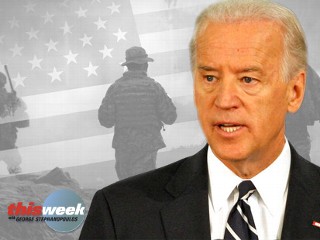
The first thing the VP does is agree with the President in public at all times. Throughout the interview, whenever Stephanopoulos asked about Biden’s position in the internal debates, Biden rebuffed him saying that the President’s plan was the right one. Biden’s appearance was in the backdrop of a major mission to Iraq as a high-level emissary and in the interview some other tasks were also discussed.
STEPHANOPOULOS: So you're in charge of the stimulus. You're the president's envoy here in Iraq. You're supposed to settle this dispute between the director of national intelligence and the CIA over who is going to appoint the station chiefs. By the way, have you solved that one yet?A number of interesting points here. First, is the last – that every task has an end date. Ongoing responsibilities become albatrosses that rivals can use to sideline the VP (ask the late Nelson Rockefeller). From a bureaucratic politics standpoint, Biden’s role adjudicating between the DNI and CIA over the appointment of station chiefs is particularly interesting. Some useful background on why this was important is here.
BIDEN: I think we've solved that one.
STEPHANOPOULOS: You have?
BIDEN: Well, let me put it this way. I think we're well on the way to that being solved.
STEPHANOPOULOS: Who won?
BIDEN: They both won.
STEPHANOPOULOS: So they're going to share the responsibility to appoint to station chiefs?
BIDEN: Not done yet. Let me comment on that next week to you.
STEPHANOPOULOS: OK. Well, let me get to the broader point then. You've fixed -- you say you've fixed a problem that will?
BIDEN: Well they fixed the problem.
STEPHANOPOULOS: ? to find out that they fixed the problem -- look to find out the details on all of that. But you've got all of these discrete projects now. And when you came in you talked a lot about how you didn't want to get bogged down in individual projects because you wanted to be, you know, the president's primary adviser.
Are you're worried you're going to far in the other direction?
BIDEN: No. Because all of these projects have end dates on them. You know, they all have sell-by dates, because -- and that's I think that -- I hope I've brought some real expertise to this job, available to the president.
The things he has asked me to do. I hope I'm relatively good at. And -- but all of them have specific objectives.
Turf wars are part of the process and unavoidable. The trick is to manage them, Coordination, according to Harold Seidman is the “twentieth-century equivalent of the medieval search for the philosopher’s stone… If only we can find the right formula for coordination, we can reconcile the irreconcilable, harmonize competing and wholly divergent interests, overcome irrationalities in our government structures, and make hard policy choices to which no one will dissent.”
However, in his masterful Bureaucracy: What Government Agencies Do and Why They Do It James Q. Wilson writes that the most successful coordinating bodies have served as adjudicators and focused on settling policy disputes between agencies. It did not compete with agencies or attempt to alter their operations. The most important component in making this operation work however, is support from the President. The agency chiefs must be clear that end runs to the President on the topic are unacceptable.
It appears that this is the role Biden is playing in the station chief dispute. It is a good use of an experienced politician and other VPs have prospered in it. Whether the Biden’s Iraq mission or role in overseeing the stimulus package also follow this model are another question.
No comments:
Post a Comment